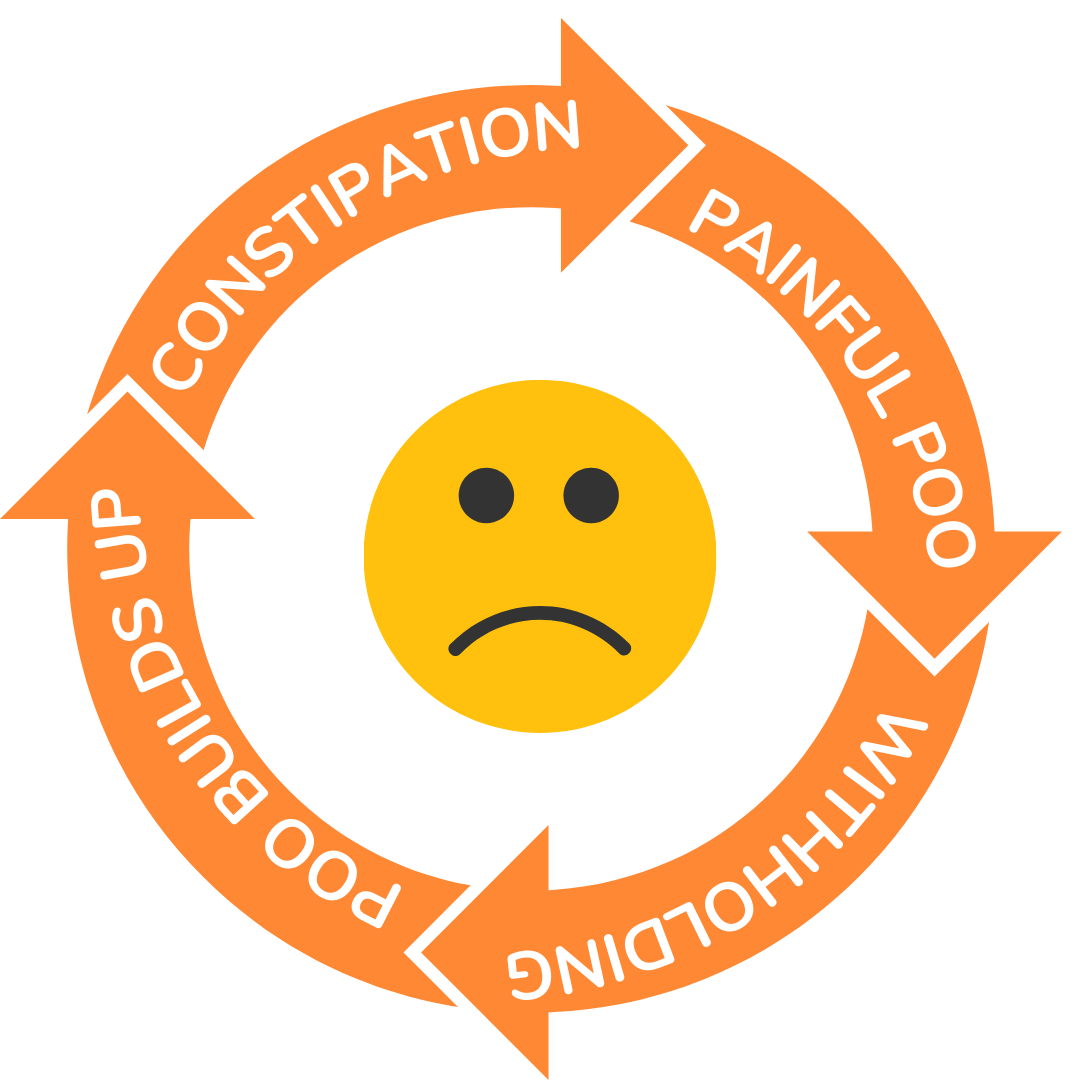Dealing with the toilet terrors – why your child is refusing to do a poo or wee and how you can help them!
Written by Alina Lynden, from ERIC, The Children’s Bowel & Bladder Charity
Around three in every four calls we get to our helpline at ERIC, The Children’s Bowel and Bladder Charity are from families of children (usually toddlers) who are all struggling with the same problem – letting go of poo and wee.
Stool withholding and delaying emptying the bladder are both issues which can cause a huge amount of stress and confusion to families, but help is out there.
In this blog I explain why withholding can happen, the effect it can have on your child's body and behaviour and what you can do to help them to relax and feel more positive about going to the loo.
What is withholding?
Withholding is when a child uses their bottom or bladder muscles to stop themselves from passing a wee or poo.
Why do some children withhold?
There can be lots of different reasons why a child will stop themselves from weeing or pooing. It could be just one or a combination of issues.
Withholding most commonly follows on from a period of constipation. This could be brief - perhaps the child had a viral illness, a high temperature with poorer drinking. Their poo became drier, hard and knobbly. It hurt them so they decided ‘I won’t ever do one again’.
This can happen at any age, they and their family may not even recall the event, but the child develops a fear of letting poo out because they are scared it will hurt.
Other factors include a change in routine such as starting nursery/pre-school, potty training and getting used to not wearing a nappy for the first time and using a bathroom away from home especially public toilets.
When can this start?
Withholding can affect children right from birth – if a baby gets constipated, they may try to prevent themselves from going. It is most common in two to four year olds, but it can also affect school-age children.
Signs of withholding
There are lots of different signs and clues to look for and some can be harder to read than others.
If a child is straining on the potty, for example, it may look as though they are trying to push out a poo, when actually they are desperate to stop it from leaving their body.
Other signs your child is avoiding doing a wee or poo include:
Stopping suddenly during play and making unusual facial expressions such as grimacing.
Crouching or sitting when the poo begins to emerge and then standing up quickly to prevent it coming out.
Holding their bodies at a different angle, go rigid and standing on their tip toes.
Seeming vacant and not responding to instructions. It can take a huge amount of effort and concentration to hold on. Your child may get cross if you interrupt them at this point or seem 'unreachable'.
Going into denial e.g. "I don't need a poo and I haven't had an accident" when you can clearly smell that they have! This is a classic stress response to a situation they feel embarrassed about but don't know how to stop or control.
‘Smudges’ of poo in their pants or nappy. This is where the poo is trying to come out through the anus - it may brush the pants, then your child realises what is happening and ‘sucks’ the poo back in.
Damp pants may also be an indication that your child is only allowing a dribble of wee out at a time.
Hiding in a favourite, safe ‘pooing’ space - behind the sofa, rolled up in a curtain, in a corner or even behind a barricade of toys.
The ‘withholding cycle’
Withholding poo is very likely to result in constipation. The longer the poo stays in the bowel, the harder, drier and bigger it gets. This makes it even more difficult and painful to pass.
An overloaded bowel can also lead to bladder issues such as urinary tract infections because the bladder can’t empty properly.
How can withholding affect a child’s behaviour?
Along with physical problems such as constipation, withholding can also have a significant emotional effect on a child and make it very hard for families to reason with their child. These upsetting behavioural changes can include mood swings, becoming withdrawn, tantrums and meltdowns.
Some children are affected just briefly, particularly if the trigger is something like potty training or a period of illness like diarrhoea.
However, for other children the withholding goes on much longer and becomes a difficult behaviour to break.
Breaking the withholding cycle:
“Stool withholding is still a very misunderstood issue. Most parents, it seems, have little or no knowledge of it. And, unfortunately, many health professionals are not up-to-speed on the subject. Finding the correct advice, as early as possible, is essential but can be challenging.” Sophia Ferguson, Author of Stool Withholding and Your Child.
Resolving withholding (that happened because of hard poos) needs a ‘two pronged’ approach, first to sort the physical, then working on the psychological and behavioural effects that the physical problem created. If hard poo was the reason it started, it’s important to:
Treat the constipation first.
When their poo is reliably soft, you can start working on reassurance and confidence building.
Remember relaxation is key to pooing and weeing.
Take time to make sure your child is as comfortable as possible in the bathroom - there are lots of tips to help with this stage in our resource on Toilet Anxiety.
Your child needs to believe that their poo will not hurt them anymore. Many children will not trust it when they are told their poos are ok now, they need to see for themselves.
Get more tips for helping your child including using rewards effectively.
Do children do it on purpose to get attention or are they being lazy?
No! This is a myth we’re really keen to bust at ERIC. It's important to remember that children don’t withhold on purpose or to be naughty. It can help to think about how we all try to avoid things that hurt us, but as adults we have learnt about consequences and can understand the risk of long term effects.
Will my child grow out of withholding?
No, not without help. Withholding and constipation go hand-in-hand and constipation is a medical condition which needs to be treated. Treating constipation early will give the best chance of a good outcome. See our Advice for Children with Constipation to get more information.
About ERIC:
ERIC, The Children’s Bowel & Bladder Charity is dedicated to helping all children and teenagers manage and overcome distressing continence conditions. Whether it is a toilet-training issue, bedwetting, constipation or soiling problem, ERIC provides expert support, information and understanding to children and young people and enables parents, carers and professionals to help them establish good bowel and bladder health.
ERIC’s family support includes a free helpline, parent and family workshops, online resources and information.
Helpline: 0808 169 9949 open Monday – Thursday 10am – 2pm
Website: www.eric.org.uk
If you want more information about potty / toilet training have a look at our other Toilet Training blogs or download our step by step video guide.
We also have two Podcasts on Toilet Training including one where we talk to Alina about withholding, toilet training, constipation and more - you can listen to both episodes here: Newborn to Teen and Everything In Between.




